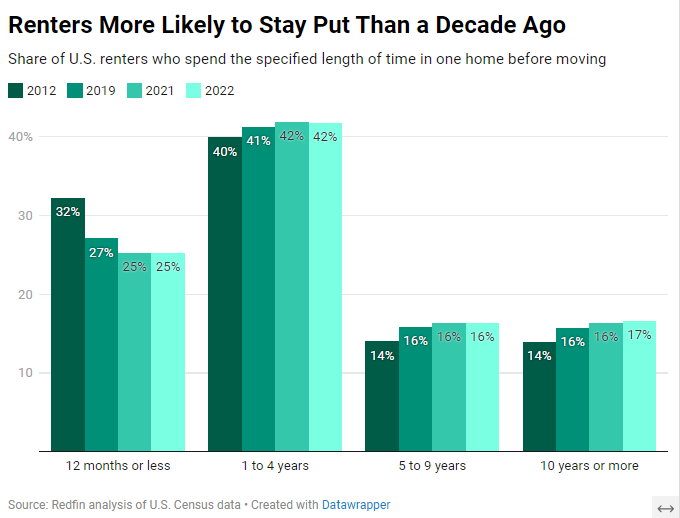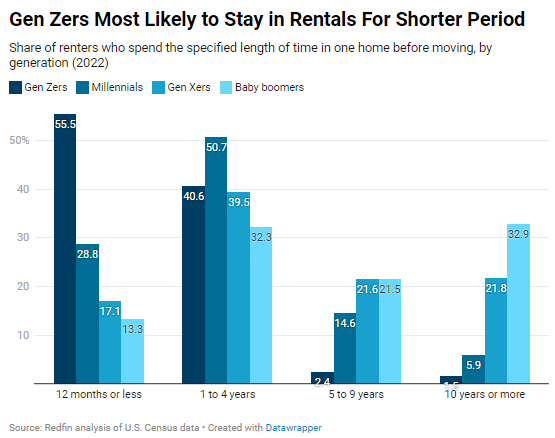U.S. renters are less likely to move than they were a decade ago, as soaring housing costs have priced many out of homeownership. The rise of remote work is another factor leading more people to choose the renting lifestyle, for flexibility and convenience.
Most U.S. renters move within five years, but they’re more likely to live in one home for the long haul than they were a decade ago.

This is according to a Redfin analysis of renter tenure data from the U.S. Census Bureau. There are more methodology details at the end of this report.
“The uptick in tenure is beneficial for renters and their landlords,” said Redfin Senior Economist Sheharyar Bokhari. “While the fact that people are staying longer in their rentals may mean they can’t afford to buy a home in today’s market, staying put also means they’re saving some money that could eventually go toward a down payment if they do have a goal of homeownership. Staying in the same home means they’re likely to face smaller rent increases, and they’re saving money on moving costs and application fees. Landlords typically prefer long-term tenants because they don’t have to spend money on cleaning and marketing vacant units.”
There are a few main reasons renters are staying put in their homes longer than they used to:
Renters move less often than they did a decade ago, but they move much more often than homeowners. Just one in five (20.8%) renters nationwide moved in 2022, down from 28.9% in 2012. Just 7.6% of homeowners moved in 2022, up slightly from 6.4% in 2012.
Bokhari noted that it’s possible we could start to see renter tenure decline soon. There was an apartment-building boom in 2023, giving renters more options for places to move and cooling rental-price growth.
Gen Z renters are much more likely than renters of other generations to move within one year, while baby boomers are much more likely to live in their rental for 10-plus years.

There are several reasons young renters move a lot. Many adult Gen Zers are in college or in the early stages of their career, life stages that often beget moves. They also have more flexibility because they’re less likely than millennials and Gen Xers to have children living at home. Additionally, many Gen Zers and millennials move out of rentals into the first home they purchase.
The 50 most populous U.S. metros are included in this section
The data in this report is from a Redfin analysis of renter tenure data from the U.S. Census Bureau’s American Community Survey* conducted in 2022, the most recent year for which this data is available.
The survey asks respondents whether they have moved within the last year, and U.S. residents receive the survey at different points throughout the year. That means the numbers reported for each year include both respondents who moved that year and people who moved the previous year.
* ACS data was retrieved from IPUMS USA:
Steven Ruggles, Sarah Flood, Matthew Sobek, Daniel Backman, Annie Chen, Grace Cooper, Stephanie Richards, Renae Rodgers, and Megan Schouweiler. IPUMS USA: Version 15.0 [dataset]. Minneapolis, MN: IPUMS, 2024. https://doi.org/10.18128/D010.V15.0


